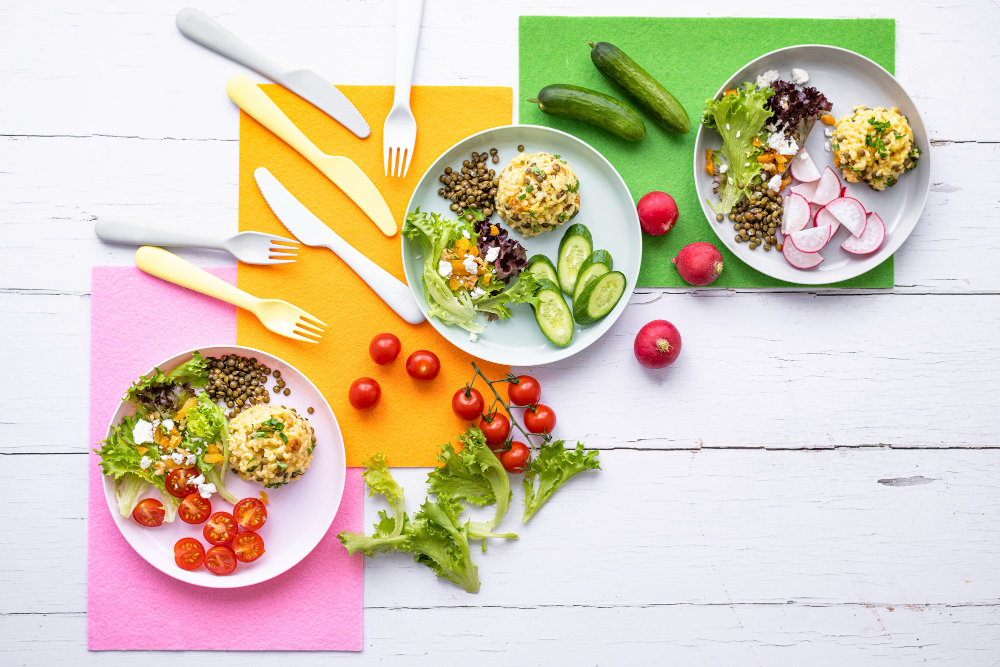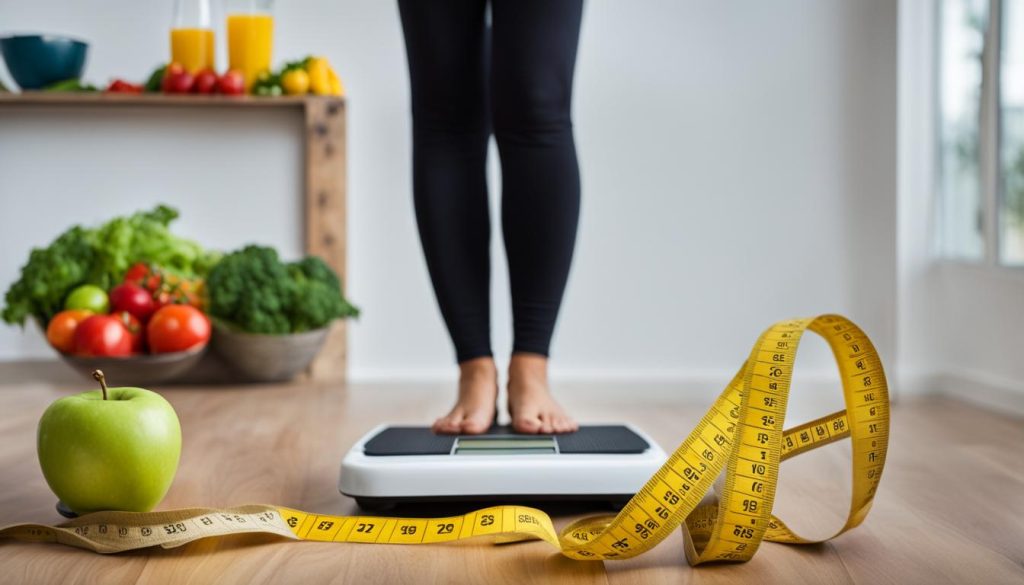Embarking on a journey toward a healthier, fitter you involves more than just counting calories and shedding pounds. It’s about embracing a lifestyle that promotes not only weight loss but also overall well-being. In this comprehensive guide, we’ll explore 31 practical tips that encompass the spectrum of a holistic approach to weight loss.
From mindful eating to incorporating the best weight loss practices, this roadmap is designed to help you navigate the often overwhelming terrain of wellness. So, let’s dive in and discover how to achieve your goals with a focus on sustainable changes, effective strategies, and a mindset that extends beyond a mere weight reduction program. Transforming your lifestyle begins here — one tip at a time.

Table of Contents
1. Eat Slowly
Eating slowly is a simple yet effective strategy for weight loss. When you consume your meals at a leisurely pace, it allows your body to register fullness more accurately. This, in turn, prevents overeating as your brain has time to signal satiety before you’ve gone for seconds.
Additionally, savoring each bite enhances the overall dining experience, making meals more satisfying. Cultivating a mindful approach to eating by appreciating the flavors and textures of your food can lead to better digestion and a more mindful relationship with your diet.
2. Enjoy the Food You Eat
Weight loss doesn’t have to be synonymous with deprivation. Embracing a positive attitude toward the food you consume can contribute to a sustainable and enjoyable weight loss journey. Savoring meals, finding joy in the cooking process, and exploring new recipes can make the weight loss process more sustainable.
When you take pleasure in your food choices, you’re more likely to make healthier decisions in the long run, fostering a positive and balanced relationship with eating. The best way to lose weight is to savor every bite. Find joy in preparing and consuming nutritious meals. This not only makes the process enjoyable but also helps you make better food choices.
3. Keep a Daily Gratitude Journal
Mindful eating is an essential part of any weight loss program. Keeping a gratitude journal can help you appreciate the positive aspects of your journey, fostering a positive mindset crucial for successful weight management. Maintaining a daily gratitude journal might seem unrelated to weight loss, but it can play a significant role in fostering a positive mindset.
Expressing gratitude for your body, the ability to nourish it, and the progress you make can enhance your overall well-being. A positive outlook can contribute to healthier lifestyle choices, making it easier to stick to a weight loss plan. When you appreciate the small victories and positive aspects of your journey, you’re more likely to stay motivated and committed to your weight loss goals.
4. Batch Cook and Prep
Preparing your meals in advance ensures you have healthy options readily available. Batch cooking on weekends can save time during the week, making it easier to stick to your weight loss diet. Streamlining your meal preparation through batch cooking and planning can be a game-changer for weight loss.
By having healthy, portioned meals readily available, you reduce the temptation to opt for less nutritious options when hunger strikes. Batch cooking also saves time and helps you make mindful choices about ingredients and portion sizes, contributing to a more controlled and intentional approach to eating. This strategy empowers you to align your nutrition with your weight loss goals while fitting into a busy lifestyle.
5. Don’t Forget the Weights
While cardio is beneficial, incorporating weight training into your routine is equally important. Building muscle helps boost your metabolism, making it one of the fastest ways to lose weight. Incorporating strength training into your fitness routine is essential for effective weight loss.
While cardio exercises burn calories during the activity, weight training builds lean muscle mass, which boosts your metabolism, leading to increased calorie burning even at rest. Furthermore, as you lose weight, preserving muscle mass helps achieve a toned and sculpted physique. Don’t underestimate the power of a well-rounded exercise routine that includes both cardiovascular workouts and strength training for sustainable and comprehensive weight loss results.
6. Get Enough Z’s
Adequate sleep is often overlooked in weight loss programs. Lack of sleep can disrupt hormonal balance, leading to increased cravings and decreased willpower. Prioritize a good night’s sleep for better results. Incorporating strength training into your fitness routine is essential for effective weight loss.
While cardio exercises burn calories during the activity, weight training builds lean muscle mass, which boosts your metabolism, leading to increased calorie burning even at rest. Furthermore, as you lose weight, preserving muscle mass helps achieve a toned and sculpted physique. Don’t underestimate the power of a well-rounded exercise routine that includes both cardiovascular workouts and strength training for sustainable and comprehensive weight loss results.
7. Don’t Skip Meals
Skipping meals can slow down your metabolism and lead to overeating later in the day. Stick to a regular eating schedule to keep your energy levels stable and support your weight reduction plan. Contrary to popular belief, skipping meals does not equate to weight loss success.
Regular, balanced meals help regulate blood sugar levels and prevent excessive hunger, reducing the likelihood of overeating later in the day. Skipping meals often leads to increased cravings for unhealthy snacks, making it challenging to maintain a calorie deficit. Instead of skipping meals, focus on portion control and nutrient-dense foods to sustain energy levels and support your weight loss journey.
8. Stay Hydrated
Drinking enough water is crucial for overall health and an effective weight loss plan. Sometimes, our bodies confuse thirst with hunger. Staying hydrated helps avoid unnecessary snacking. Proper hydration is often overlooked but is crucial for weight loss. Drinking an adequate amount of water can help control appetite, as thirst can be mistaken for hunger.
Additionally, staying hydrated supports your body’s natural detoxification processes and enhances metabolism. Replace sugary drinks with water and make it a habit to drink water before meals to promote a feeling of fullness. By prioritizing hydration, you create a foundation for overall well-being and effective weight management.
9. Cut Calories, Not Flavor
Healthy eating doesn’t mean sacrificing flavor. Experiment with herbs, spices, and healthy cooking techniques to create delicious meals without excess calories. Embarking on a weight loss journey doesn’t mean sacrificing flavor.
Opt for nutrient-dense, flavorful foods and explore various herbs and spices to enhance taste without adding excessive calories. Make smart substitutions, such as using Greek yogurt instead of sour cream or incorporating more vegetables into your meals. By focusing on the quality and variety of your food, you can create a sustainable and enjoyable eating plan that supports weight loss without feeling deprived.
10. Reorganize Your Plate
Balance is key. Ensure your plate is filled with a variety of colorful vegetables, lean proteins, and whole grains. Reorganizing your plate can make a significant difference in achieving a balanced and nutritious diet. Embarking on a weight loss journey doesn’t mean sacrificing flavor. Opt for nutrient-dense, flavorful foods and explore various herbs and spices to enhance taste without adding excessive calories.
Make smart substitutions, such as using Greek yogurt instead of sour cream or incorporating more vegetables into your meals. By focusing on the quality and variety of your food, you can create a sustainable and enjoyable eating plan that supports weight loss without feeling deprived.
11. Start Where You Are and Do What You Can
Embarking on a weight loss journey can be overwhelming. Start small, focus on achievable goals, and gradually build up. Consistent progress, no matter how small, is the key to success. Embarking on a weight loss journey doesn’t require drastic changes overnight. Start where you are, focusing on small, achievable steps.
Set realistic goals that align with your current lifestyle, gradually incorporating healthier habits. This approach not only makes the process more manageable but also increases the likelihood of long-term success. By acknowledging your starting point and taking gradual steps, you build a foundation for sustainable and positive changes.
12. Think Big — Not Small
Set ambitious but realistic goals. Thinking big helps you stay motivated and committed to your weight loss plan. While setting small, achievable goals is essential, it’s equally important to think big in terms of your overall vision for health and well-being.
Envision the larger impact of your weight loss journey on your life, relationships, and overall happiness. This broader perspective can motivate during challenging times and help you stay committed to your goals. By thinking big, you tap into the transformative power of your weight loss journey beyond the physical aspects.
13. Look Beyond the Scale
Numbers on the scale don’t tell the whole story. Monitor changes in how your clothes fit, energy levels, and overall well-being. This holistic approach provides a more accurate picture of your progress. While the scale is a common measure of progress, it doesn’t tell the full story of your weight loss journey.
Look beyond the scale and consider other indicators of success, such as increased energy levels, improved mood, and enhanced overall well-being. Focusing on non-scale victories reinforces the positive changes you’re making, promoting a healthier mindset and sustained motivation. By appreciating the holistic benefits of your journey, you create a more fulfilling and meaningful approach to weight loss.
14. Give Your Breakfast a Protein Boost
A healthy weight loss breakfast should include protein. Protein-rich meals help control hunger and keep you feeling satisfied throughout the day. While the scale is a common measure of progress, it doesn’t tell the full story of your weight loss journey.
Look beyond the scale and consider other indicators of success, such as increased energy levels, improved mood, and enhanced overall well-being. Focusing on non-scale victories reinforces the positive changes you’re making, promoting a healthier mindset and sustained motivation. By appreciating the holistic benefits of your journey, you create a more fulfilling and meaningful approach to weight loss.
15. In Fact, Consume Protein at Every Meal
Protein is essential for muscle repair and satiety. Ensure you incorporate protein-rich foods into every meal to support your fat loss diet. Distributing protein intake throughout the day is key for weight loss and muscle preservation.
Including protein in each meal helps regulate hunger, supports muscle repair and growth, and enhances the thermic effect of food (calories burned during digestion). Choose a variety of protein sources, including lean meats, fish, legumes, and plant-based options, to create balanced and satisfying meals that contribute to your weight loss goals.
16. Try to Eat Mainly Whole, Minimally Processed Foods
Whole foods are nutrient-dense and promote overall health. Minimize processed foods in your diet for better results in your weight loss journey. Aim to prioritize whole, minimally processed foods in your diet for effective weight loss.
Whole foods, such as fruits, vegetables, whole grains, and lean proteins, are rich in nutrients and fiber, promoting satiety and overall well-being. Minimally processed foods retain more of their natural nutritional value and are often lower in added sugars, salt, and unhealthy fats. By focusing on these nutrient-dense choices, you create a foundation for sustainable and nourishing eating habits.
17. Limit High-Glycemic Carbohydrate Foods
High-glycemic carbohydrates cause rapid spikes and crashes in blood sugar levels, leading to increased cravings. Opt for complex carbohydrates to maintain steady energy levels. Controlling the intake of high-glycemic carbohydrates can be beneficial for weight loss.
These carbohydrates, which rapidly spike blood sugar levels, can lead to increased hunger and cravings. Choose complex carbohydrates with a lower glycemic index, such as whole grains, legumes, and vegetables, to provide sustained energy and help regulate appetite. This approach contributes to a more stable blood sugar profile and supports overall weight management.
18. Experiment With Fruits at Dessert Time
Satisfy your sweet tooth with healthy fruits instead of sugary desserts. This simple switch can make a significant impact on your weight loss plan. Satisfy your sweet tooth with the natural sweetness of fruits during dessert time.
Fruits offer a nutritious and satisfying alternative to traditional desserts that are often high in added sugars and empty calories. Experiment with different fruits, whether fresh, frozen, or prepared in creative ways, to create delicious and guilt-free desserts. By incorporating fruits into your dessert routine, you indulge in a sweet treat while supporting your weight loss goals with nutrient-dense choices.
19. Eat Breakfast Like a King, Lunch Like a Prince, and Dinner Like a Pauper
Front-load your calories by consuming a substantial breakfast. As the day progresses, reduce portion sizes, promoting better digestion and metabolism. Adopting the principle of eating a substantial breakfast, a moderate lunch, and a lighter dinner can optimize your body’s metabolism and support weight loss.
Breakfast provides essential energy for the day, while a lighter dinner helps prevent excess calorie consumption before bedtime. This approach aligns with natural circadian rhythms and promotes better digestion. By distributing your calorie intake throughout the day, you enhance nutrient absorption and create a balanced eating pattern conducive to weight loss.
20. Get Into Meal Planning
Meal planning helps you make intentional choices about your food. Having a plan in place reduces the likelihood of impulsive, unhealthy decisions. Meal planning is a valuable tool for weight loss, helping you make intentional and nutritious food choices. Plan your meals for the week, incorporating a variety of foods that align with your weight loss goals.
This strategy not only ensures that you have healthy options readily available but also reduces the likelihood of impulsive, less healthy choices. By investing time in meal planning, you set yourself up for success and create a structure that supports your journey to a healthier lifestyle.
21. Make a Grocery List and Stick to It
Avoid temptation at the store by having a grocery list. Stick to your list to prevent impulse purchases that may derail your weight loss plan. A key aspect of successful weight loss is mindful grocery shopping.
Before heading to the store, create a detailed grocery list that aligns with your meal plan and health goals. Stick to the list to avoid impulse purchases of unhealthy snacks or processed foods. By adopting this disciplined approach to grocery shopping, you create an environment that supports your weight loss journey and reinforces positive food choices.
22. Take Stock of What’s in Your Kitchen
A healthy kitchen promotes a healthy lifestyle. Remove tempting, unhealthy foods, and stock up on nutritious alternatives. Regularly assess the contents of your kitchen to create an environment conducive to weight loss.
Remove or limit highly processed and unhealthy foods, and stock up on nutrient-dense options. Having a well-organized and healthy kitchen makes it easier to make positive food choices and reduces the temptation of reaching for less nutritious options. This proactive approach contributes to a supportive home environment that aligns with your weight loss goals.
23. Have the Right Tools on Hand
Invest in kitchen tools that make healthy cooking easier. Having the right equipment can encourage you to prepare meals at home, supporting your easy weight loss goals. Equipping yourself with the right tools can streamline your weight loss journey.
Invest in kitchen utensils, containers, and appliances that make healthy meal preparation convenient. A food scale and measuring cups help control portion sizes, promoting mindful eating. Having the right tools on hand not only facilitates healthier habits but also makes the process of adopting a nutritious and balanced diet more efficient and enjoyable.
24. Read Food Labels
Understanding what’s in your food is crucial for making informed choices. Reading food labels helps you avoid hidden sugars and unhealthy additives. Understanding food labels is essential for making informed and healthier choices.
Pay attention to serving sizes, nutritional content, and ingredient lists to identify hidden sugars, unhealthy fats, and unnecessary additives. Reading food labels empowers you to select products that align with your weight loss goals and overall well-being. By becoming a more informed consumer, you gain greater control over your nutrition and contribute to a more mindful approach to eating.
26. Try a Low-Carb Diet
Consider incorporating a low-carb diet into your weight loss program. Low-carb diets can be effective in reducing overall calorie intake and promoting fat loss. For some individuals, adopting a low-carb diet can be an effective strategy for weight loss.
Limiting the intake of refined carbohydrates and focusing on whole, nutrient-dense foods can lead to reduced calorie consumption and improved metabolic health. While this approach may not be suitable for everyone, incorporating more complex carbohydrates and emphasizing healthy fats and proteins can contribute to sustainable weight loss for those who respond well to a low-carb approach.
27. Brush Your Teeth After Meals
A simple trick to curb post-meal snacking is to brush your teeth. The minty freshness can reduce the desire for additional snacks. The simple act of brushing your teeth after meals can serve as a powerful tool for weight loss. Clean teeth act as a signal to your brain that eating time is over, reducing the temptation to snack unnecessarily.
Additionally, the minty freshness can discourage mindless eating and promote a cleaner feeling in your mouth, making you less inclined to consume additional calories. Incorporating this post-meal oral hygiene habit contributes to a more disciplined and mindful approach to eating.
28. Work to Overcome Food Addiction
Identify and address any unhealthy relationships with food. Seek support if needed to overcome food addiction and establish a healthier mindset. Acknowledging and addressing food addiction is crucial for sustainable weight loss.
Seek support from professionals, such as therapists or nutritionists, to develop strategies for overcoming unhealthy relationships with food. Understanding the emotional and psychological aspects of food addiction empowers you to make healthier choices and build a foundation for long-term success in your weight loss journey.
29. Do Some Sort of Cardio
Cardiovascular exercise is essential for burning calories and improving heart health. Find an activity you enjoy to make cardio a regular part of your routine. Cardiovascular exercise is a key component of any effective weight loss plan.
Activities like running, cycling, or swimming burn calories and improve cardiovascular health, contributing to overall well-being. Aim for at least 150 minutes of moderate-intensity cardio per week to promote weight loss and enhance fitness. Incorporate activities you enjoy to make exercise a sustainable and enjoyable part of your routine.
30. Practice Mindful Eating
Mindful eating involves being present and fully enjoying your food. It can help you recognize true hunger and fullness cues, supporting your weight loss journey. Mindful eating involves paying full attention to the sensory experience of eating, from the taste and texture of food to the act of chewing.
By practicing mindfulness during meals, you become more attuned to hunger and fullness cues, reducing the likelihood of overeating. Take time to savor each bite, chew slowly, and appreciate the nourishment your food provides. This mindful approach fosters a healthier relationship with food, supporting your weight loss journey both physically and emotionally.
31. Focus on Changing Your Lifestyle
Remember, losing weight is not just a temporary goal; it’s a lifestyle change. Focus on building sustainable habits that contribute to your overall health and well-being. Rather than approaching weight loss as a short-term goal, focus on making sustainable lifestyle changes. Adopt habits that promote overall well-being, including regular exercise, balanced nutrition, and adequate sleep. By prioritizing long-term health over quick fixes, you create a foundation for lasting weight loss success. Embrace a holistic approach that considers both physical and mental well-being, setting the stage for a healthier and more fulfilling life.
By incorporating these 31 tips into your daily life, you can create a holistic approach to weight loss that goes beyond mere dieting. Embrace the journey, celebrate small victories, and transform your lifestyle for lasting results.








